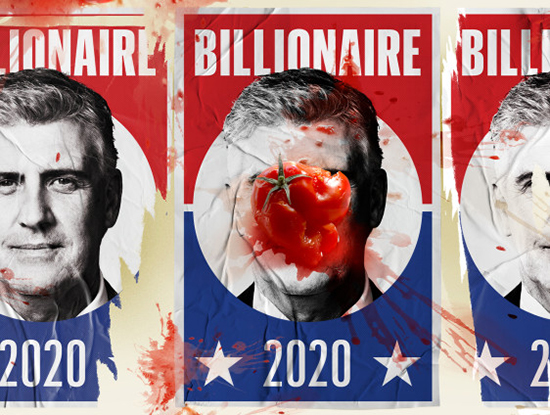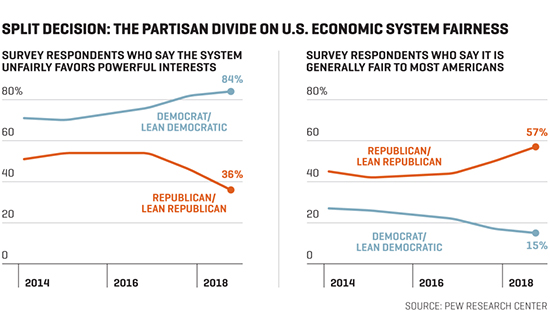
|
美国人并不仇富,但痛恨不公平。随着我们进入大选年,并尝试理解美国对亿万富翁爱恨交加的感情时,这些事实值得我们去留意。在这些亿万富翁中,有三位正在竞选总统。我们有必要了解这种态度,因为亿万富翁问题必然也是下一任总统需要重点处理的问题,而且这个与谁当总统无关。 这是一个奇怪的政治时刻。在全国民调中排名前三的民主党候选人中,有两位,也就是伯尼·桑德斯和伊丽莎白·沃伦,都会不时地在一定程度上将亿万富翁描述为万恶之源。桑德斯曾经说:“我觉得亿万富翁不应该存在于世。”排名第一的民主党候选人乔·拜登则表达的更委婉一些,他在2019年2月说道:“我并不羡慕那些能够赚一百万美元或上亿美元的人。”潜台词就是说赚10位数就有些太不像话了。然而,民主党阵营还包括两名亿万富翁,汤姆·斯特尔和新近入围的迈克尔·布隆伯格,后者仅用了数周的时间便通过电视广告的狂轰烂炸将自己推上了前排,与排名第四的候选人佩德·布蒂吉格仅有数分之差。 至于共和党,他们在这个问题上也并非就是上下一条心,尽管其候选人在三年前成为了美国第一任亿万富翁总统。 因此,人们到底是喜爱亿万富翁还是仇视他们?从党派来讲这个问题很容易回答。民调确认了我们心中所想:共和党倾向于交好亿万富翁,而民主党则相反。但大量的非党派因素令这一格局更加复杂。奥普拉·温弗瑞、史蒂芬·斯皮尔伯格、迈克尔·乔丹,他们都是亿万富翁,而且深受美国人喜爱。比尔·盖茨和沃伦·巴菲特在YouGov的2019年“谁是你最敬仰的对象”调查中几乎靠近榜首的位置,其他名列前茅的人士包括电影明星和教皇弗朗西斯。 有时候我们喜爱亿万富翁。但桑德斯和沃伦的成功入围告诉我们,有很大一部分的美国民众对他们深恶痛绝。我们在亿万富翁方面的分歧反映了两个完全不同的世界观:例如世界是如何运转的,为什么一些人走在了前面,而另一些人落在了后面,未来是光明还是黑暗。在过去几年中,让这两派产生分歧的鸿沟急剧扩大。 |
Americans don’t hate wealth. They hate injustice. Those facts are worth remembering as we enter this election year and try to understand America’s schizoid attitude toward billionaires, three of whom are running for President. It’s an attitude worth understanding because billionaires are certain to symbolize crucial issues for the next President, whoever he or she may be. It’s a bizarre political moment. Two of the top three Democratic candidates in national polling, Bernie Sanders and Elizabeth Warren, routinely vilify billionaires as more or less the root of all evil. Sanders has said, “I don’t think that billionaires should exist.” The top-polling Democrat, Joe Biden, sends a more subtle message: “I don’t begrudge anybody making a million or hundreds of millions of dollars,” he said in February, leaving unspoken that 10 figures are just too much. Yet the Democratic field also includes two billionaires, Tom Steyer and recent entrant Michael Bloomberg, who in only a few weeks has used massive TV advertising to approach the top tier, a few points behind the No. 4 candidate, Pete Buttigieg. As for the Republicans, they’re not entirely unconflicted on this subject, even though their candidate became the first billionaire President three years ago. So do we love billionaires or disdain them? Simple partisanship is the easy part of the answer. Polling confirms what we already know: Republicans tend to be billionaire-friendly, and Democrats tend not to be. What complicates the picture is a large nonpartisan element. Oprah Winfrey, Steven Spielberg, Michael Jordan—they’re all billionaires, and America loves them. Bill Gates and Warren Buffett rank near the top in YouGov’s 2019 survey asking Americans whom they admire most, interspersed among movie stars and Pope Francis. Sometimes we love billionaires. But as the success of Sanders and Warren shows, a sizable group of Americans resent them bitterly. At a deep level, our billionaire bifurcation reflects two starkly different views of the world—how it works, why some people get ahead and others don’t, whether the future is dark or bright. The divide separating those who hold these opposing views has deepened dramatically over the past few years. |

|
不妨看看一些最基本的问题:美国经济体制是否“对于大多数美国公民是公平的”,或“是否在不公平地支持权贵的利益”,皮尤研究中心在过去五年中一直在就这个问题进行调查。人们的整体看法基本没有变化:约33%的美国成年人认为其是公平的,63%表示它不公平。但仅仅在过去三年中,共和党和民主党在这个问题上呈现出极端化态势,如今,共和党说公平的可能性要大得多,而民主党则更有可能说它不公平。 大家都知道,亿万富翁成为了众矢之的。认为亿万富翁对美国有着巨大危害的人不仅仅只是像桑德斯这样的民主党社会主义分子,Cato的调查显示54%的民主党认为“亿万富翁对于民主来说是个威胁”(而79%的共和党并不赞同这一说法)。 这一历史性转变的推手是收入差距不断增加的大环境。一个不可避免的事实在于,自1967年以来,收入排名前四分之一家庭的通胀调整后收入增加了99%,而排名后四分之一的家庭仅增加了31%。共和党与民主党则按照各自背道而驰的世界观,对这一现象给出了截然不同的解释,也导致各自政策建议的矛盾比以往更加尖锐。 这也让我们回到了美国对亿万富翁爱恨交加的情结问题。在我们所处的超级党派环境中,即便出现两个极端的选举结果也是完全合理的。民主党热衷于改革的一派可能会大获全胜,他们会提出了一个前所未有的反亿万富翁主张,将富人征税税率提升至新的历史高度。然而选民们还可能给出一个完全相反但同样前所未有的选举结果:2020年1月,美国可能会第二次见证一位来自于其中一个党派的亿万富翁入主白宫。 (财富中文网) 本文另一版本登载于《财富》杂志2020年1月刊,标题为《遭鄙视的亿万富翁》。 译者:冯丰 审校:夏林 |
Consider the fundamental question of whether the U.S. economic system “is generally fair to most Americans” or “unfairly favors powerful interests,” as the Pew Research Center has posed it for the past five years. Overall sentiment has barely budged: About 33% of U.S. adults say it’s fair, and 63% say it’s unfair. But in just the past three years, Republicans and Democrats have polarized on the issue, with Republicans now far more likely to say it’s fair, and Democrats far more likely to say it isn’t. Little wonder that billionaires are under fire. It’s no longer just Democratic Socialists like Bernie Sanders who believe they’re profoundly bad for the nation; Cato polling finds that 54% of Democrats believe “billionaires are a threat to democracy” (while 79% of Republicans don’t agree). Underlying this historic shift is the megatrend of increasing income disparity. The inescapable fact is that since 1967, inflation-adjusted income has increased 99% for the top quintile of households and only 31% for the bottom quintile. Republicans and Democrats frame their explanations of what happened in fundamentally different ways based on their rapidly diverging worldviews, leading to ever more sharply contrasting policy prescriptions. Which brings us back to America’s love-hate relationship with billionaires. In our hyperpartisan environment, two extreme election outcomes are entirely plausible. The Democrats’ more progressive wing could sweep, promising an unprecedented anti-billionaire agenda of historic tax increases on the wealthy. Yet voters could also deliver a completely opposite and equally unprecedented outcome: 2020 January, for the second time in U.S. history, a billionaire—of either party—could be taking the oath of office. A version of this article appears in the January 2020 issue of Fortune with the headline “The Great Big Billionaire Backlash.” |






